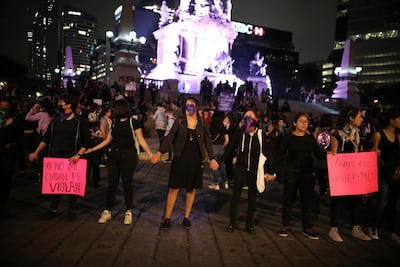Earlier this month, something close to a miracle happened. Cyntoia Brown-Long, a woman who had been languishing in a Tennessee jail for more than 15 years, was finally freed on parole. A sex-trafficking victim, she had been convicted for shooting dead the man who forced her into prostitution. Despite being just 16 years old at the time of the shooting and claiming she acted in self-defence, as she thought she would be killed herself, Brown-Long was tried as an adult and sentenced to life in prison, with no chance of parole for 51 years. She was only released after her case garnered international attention, with celebrities such as Rihanna and Kim Kardashian West supporting her cause.
At the same time, more than 10,000 kilometres away, Iraq marked a tragic anniversary: five years since ISIS overran Tal Afar, raping Turkmen women and forcing them into marriage. Of the 450 Turkmen women who were kidnapped, only a handful have returned home. Yazidi women who faced the same fate after being captured and enslaved were welcomed back into their communities by their spiritual leaders but the Turkmen women are still largely shunned by society. Ayatollah Al Sistani, the highest Shia cleric in Iraq, has yet to address their plight or welcome their reintegration into society while their children remain stateless. Stigmatised and shamed by their own communities, many have faced little choice but to remain with their captors in Syria.
The stories of Brown-Long and the women of Tal Afar might seem to be worlds apart but they have one thing in common. They demonstrate how women are punished for crimes against them, particularly victims of sexual violence. Women who have been raped or sexually abused are not always viewed as victims but often treated as somehow complicit in the vile actions of their tormentors. This victim-blaming is known as rape culture, encouraging impunity for perpetrators of sexual violence and preventing victims from coming forward in the first place.
At least 35 per cent of women worldwide have experienced physical or sexual violence. Yet only 1 per cent seek professional help and the vast majority of rape cases still go unreported
A shocking example of this was the case of Brock Turner, the Stanford university student sentenced to just six months in jail in the US in 2016 after being convicted of three charges of sexual assault. His father begged the judge in the case not to send him to prison, saying it was "a steep price to pay for 20 minutes of action". Judge Aaron Persky justified the lenient sentence by saying: "I think you have to take the whole picture in terms of what impact imprisonment has on a specific individual's life."
Yet, as Turner’s victim told the court, her attacker had failed to think of the devastating and permanent effect the violent episode would have on her. “You are the cause, I am the effect,” she told him in her victim impact statement.
According to the United Nations, at least 35 per cent of women worldwide have experienced physical or sexual violence. Yet only 1 per cent seek professional help and the vast majority of rape cases still go unreported.
From 2016, the #MeToo movement shed light on the insidious nature of rape culture, infiltrating all walks of life, from Hollywood to the workplace and home. Although the movement has encouraged more women to speak up about their experiences and seek justice, three years later the struggle is still not over.
The movement, launched by Tarana Burke, a civil rights activist from the Bronx, still needs to amplify the voices of some of the most vulnerable members of society. While Hollywood celebrities such as Angelina Jolie and Ashley Judd have been vocal in their condemnation of offenders, those who do not enjoy the same limelight sometimes struggle to be heard.
For the past week, protests have rocked Mexico – the second deadliest place in the world for women after Brazil, with 1,812 women killed this year alone. Thousands of women have been filling the streets of Mexico City, spraying police officers with pink glitter, after two teenage girls were allegedly raped by police officers. The allegations have led to heightened feelings in a country where women face constant threats from violence and harassment. So far this year, 200 Mexican women have been kidnapped.
Rape culture is pervasive, wherever it is found; it fosters the idea of impunity for sex crimes and pins the blame firmly on the victim. We can and must do better to counter these toxic narratives and change societal attitudes to encourage victims to come forward. The language we use plays a big part in that; there are no crimes of passion, only violence, assault and murder, and they should be named as such. Only when we stop treating victims as if they are the ones on trial will we encourage them to seek justice.
Key facilities
- Olympic-size swimming pool with a split bulkhead for multi-use configurations, including water polo and 50m/25m training lanes
- Premier League-standard football pitch
- 400m Olympic running track
- NBA-spec basketball court with auditorium
- 600-seat auditorium
- Spaces for historical and cultural exploration
- An elevated football field that doubles as a helipad
- Specialist robotics and science laboratories
- AR and VR-enabled learning centres
- Disruption Lab and Research Centre for developing entrepreneurial skills
Apple%20Mac%20through%20the%20years
%3Cp%3E1984%20-%20Apple%20unveiled%20the%20Macintosh%20on%20January%2024%3Cbr%3E1985%20-%20Steve%20Jobs%20departed%20from%20Apple%20and%20established%20NeXT%3Cbr%3E1986%20-%20Apple%20introduced%20the%20Macintosh%20Plus%2C%20featuring%20enhanced%20memory%3Cbr%3E1987%20-%20Apple%20launched%20the%20Macintosh%20II%2C%20equipped%20with%20colour%20capabilities%3Cbr%3E1989%20-%20The%20widely%20acclaimed%20Macintosh%20SE%2F30%20made%20its%20debut%3Cbr%3E1994%20-%20Apple%20presented%20the%20Power%20Macintosh%3Cbr%3E1996%20-%20The%20Macintosh%20System%20Software%20OS%20underwent%20a%20rebranding%20as%20Mac%20OS%3Cbr%3E2001%20-%20Apple%20introduced%20Mac%20OS%20X%2C%20marrying%20Unix%20stability%20with%20a%20user-friendly%20interface%3Cbr%3E2006%20-%20Apple%20adopted%20Intel%20processors%20in%20MacBook%20Pro%20laptops%3Cbr%3E2008%20-%20Apple%20introduced%20the%20MacBook%20Air%2C%20a%20lightweight%20laptop%3Cbr%3E2012%20-%20Apple%20launched%20the%20MacBook%20Pro%20with%20a%20retina%20display%3Cbr%3E2016%20-%20The%20Mac%20operating%20system%20underwent%20rebranding%20as%20macOS%3Cbr%3E2020%20-%20Apple%20introduced%20the%20M1%20chip%20for%20Macs%2C%20combining%20high%20performance%20and%20energy%20efficiency%3Cbr%3E2022%20-%20The%20M2%20chip%20was%20announced%3Cbr%3E2023%20-The%20M3%20line-up%20of%20chip%20was%20announced%20to%20improve%20performance%20and%20add%20new%20capabilities%20for%20Mac.%3C%2Fp%3E%0A
Specs
Engine: Electric motor generating 54.2kWh (Cooper SE and Aceman SE), 64.6kW (Countryman All4 SE)
Power: 218hp (Cooper and Aceman), 313hp (Countryman)
Torque: 330Nm (Cooper and Aceman), 494Nm (Countryman)
On sale: Now
Price: From Dh158,000 (Cooper), Dh168,000 (Aceman), Dh190,000 (Countryman)
The results of the first round are as follows:
Qais Saied (Independent): 18.4 per cent
Nabil Karoui (Qalb Tounes): 15.58 per cent
Abdelfattah Mourou (Ennahdha party): 12.88 per cent
Abdelkarim Zbidi (two-time defence minister backed by Nidaa Tounes party): 10.7 per cent
Youssef Chahed (former prime minister, leader of Long Live Tunisia): 7.3 per cent
UK-EU trade at a glance
EU fishing vessels guaranteed access to UK waters for 12 years
Co-operation on security initiatives and procurement of defence products
Youth experience scheme to work, study or volunteer in UK and EU countries
Smoother border management with use of e-gates
Cutting red tape on import and export of food
Results:
6.30pm: Maiden | US$45,000 (Dirt) | 1,400 metres
Winner: Tabarak, Royston Ffrench (jockey), Rashed Bouresly (trainer)
7.05pm: Handicap | $175,000 (Turf) | 3,200m
Winner: Dubhe, William Buick, Charlie Appleby
7.40pm: UAE 2000 Guineas Group 3 | $250,000 (D) | 1,600m
Winner: Estihdaaf, Christophe Soumillon, Saeed bin Suroor
8.15pm: Handicap | $135,000 (T) | 1,800m
Winner: Nordic Lights, William Buick, Charlie Appleby
8.50pm: Al Maktoum Challenge Round 2 Group 2 | $450,000 (D) | 1,900m
Winner: North America, Richard Mullen, Satish Seemar
9.25pm: Handicap | $175,000 (T) | 1,200m
Winner: Mazzini, Adrie de Vries, Fawzi Nass
10pm: Handicap | $135,000 (T) | 1,400m.
Winner: Mubtasim, William Buick, Charlie Appleby
Strait of Hormuz
Fujairah is a crucial hub for fuel storage and is just outside the Strait of Hormuz, a vital shipping route linking Middle East oil producers to markets in Asia, Europe, North America and beyond.
The strait is 33 km wide at its narrowest point, but the shipping lane is just three km wide in either direction. Almost a fifth of oil consumed across the world passes through the strait.
Iran has repeatedly threatened to close the strait, a move that would risk inviting geopolitical and economic turmoil.
Last month, Iran issued a new warning that it would block the strait, if it was prevented from using the waterway following a US decision to end exemptions from sanctions for major Iranian oil importers.
How to help
Send “thenational” to the following numbers or call the hotline on: 0502955999
2289 – Dh10
2252 – Dh 50
6025 – Dh20
6027 – Dh 100
6026 – Dh 200
The specs
Engine: 2.0-litre 4-cyl turbo
Power: 247hp at 6,500rpm
Torque: 370Nm from 1,500-3,500rpm
Transmission: 10-speed auto
Fuel consumption: 7.8L/100km
Price: from Dh94,900
On sale: now
British Grand Prix free practice times in the third and final session at Silverstone on Saturday (top five):
1. Lewis Hamilton (GBR/Mercedes) 1:28.063 (18 laps)
2. Sebastian Vettel (GER/Ferrari) 1:28.095 (14)
3. Valtteri Bottas (FIN/Mercedes) 1:28.137 (20)
4. Kimi Raikkonen (FIN/Ferrari) 1:28.732 (15)
5. Nico Hulkenberg (GER/Renault) 1:29.480 (14)
The Bio
Favourite place in UAE: Al Rams pearling village
What one book should everyone read: Any book written before electricity was invented. When a writer willingly worked under candlelight, you know he/she had a real passion for their craft
Your favourite type of pearl: All of them. No pearl looks the same and each carries its own unique characteristics, like humans
Best time to swim in the sea: When there is enough light to see beneath the surface
UAE currency: the story behind the money in your pockets
WHAT IS GRAPHENE?
It was discovered in 2004, when Russian-born Manchester scientists Andrei Geim and Kostya Novoselov were experimenting with sticky tape and graphite, the material used as lead in pencils.
Placing the tape on the graphite and peeling it, they managed to rip off thin flakes of carbon. In the beginning they got flakes consisting of many layers of graphene. But when they repeated the process many times, the flakes got thinner.
By separating the graphite fragments repeatedly, they managed to create flakes that were just one atom thick. Their experiment led to graphene being isolated for the very first time.
In 2010, Geim and Novoselov were awarded the Nobel Prize for Physics.
The National's picks
4.35pm: Tilal Al Khalediah
5.10pm: Continous
5.45pm: Raging Torrent
6.20pm: West Acre
7pm: Flood Zone
7.40pm: Straight No Chaser
8.15pm: Romantic Warrior
8.50pm: Calandogan
9.30pm: Forever Young
More from Neighbourhood Watch:
KILLING OF QASSEM SULEIMANI
Europe's top EV producers
- Norway (63% of cars registered in 2021)
- Iceland (33%)
- Netherlands (20%)
- Sweden (19%)
- Austria (14%)
- Germany (14%)
- Denmark (13%)
- Switzerland (13%)
- United Kingdom (12%)
- Luxembourg (10%)
Source: VCOe
More from Neighbourhood Watch
Killing of Qassem Suleimani



